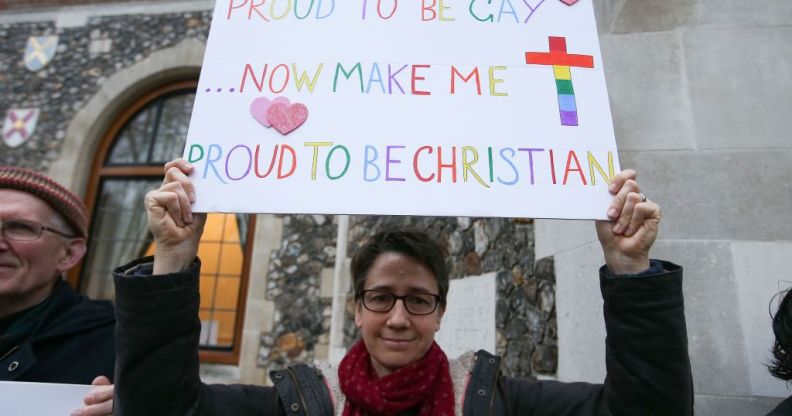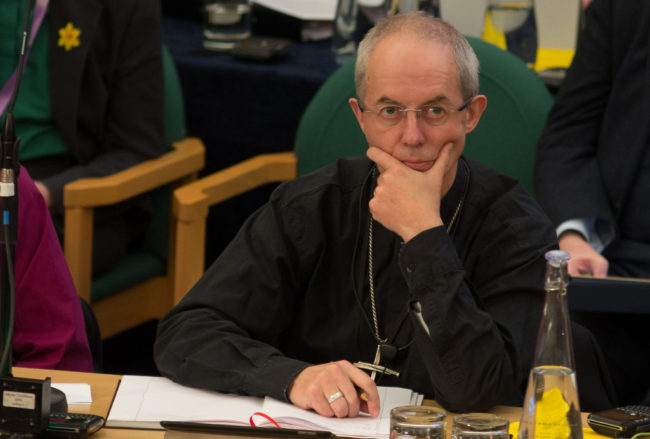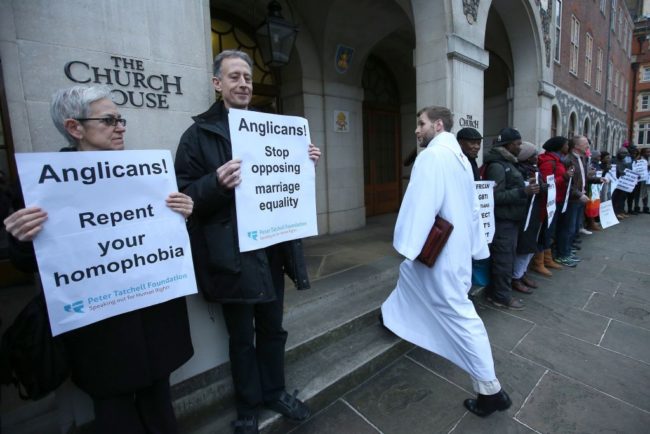Church of England to debate condemning gay conversion therapy

Demonstrators hold placards as they protest outside Church House, the venue of the Church of England’s General Synod, in 2017. (AFP/ Getty/ DANIEL LEAL-OLIVAS)
The Church of England will debate condemning so-called gay conversion therapy and holding special services to celebrate trans people’s transitions.
At its General Synod meeting in July, the Church will also re-examine its position on same-sex marriages, which it currently has a legal exemption from performing.
The attempt to improve relations with gay Christians follows the Church of Scotland’s decision yesterday to apologise for its past treatment of gay people and take steps to accepting same-sex marriage.

Justin Welby, the Archbishop of Canterbury (DANIEL LEAL-OLIVAS/AFP/Getty Images)
The Church’s parliament will ask its members whether to define so-called gay conversion therapy as “unethical, harmful” and having “no place in the modern world”.
Earlier this year, the UK government refused to make the process illegal despite receiving a petition signed by 33,000 people.
Nine US states have also banned the practice, which has been widely debunked.
The motion, by gay rights activist Jayne Ozanne, has received strong support from her fellow synod members, but will likely be opposed by a hardcore group of conservatives.
She told Christian Today: “It is incredibly important that religious organisations follow the clear lead set by the health care professions in standing against this highly damaging and unethical practice, which reinforces stigma and prejudice against the LGBTI community.
“The Bible teaches that we are each fearfully and wonderfully made, and we should therefore look to celebrate God’s gift of diversity in creation, not treat those of us who are non-heterosexual as having mental disorders that need to be ‘cured,’” she added.
If the resolution is passed, the CofE would co-sign a statement by organisations including the UK Council for Psychotherapy and The Royal College of General Practitioners.
The statement reads: “Sexual orientations and gender identities are not mental health disorders, although exclusion, stigma and prejudice may precipitate mental health issues for any person subjected to these abuses.”
Andrea Williams, a conservative member of synod, accused Ozanne of seeking “to silence dissent within the Church by deliberate misrepresentation.”
The synod will also debate a motion which could see baptism-style renaming ceremonies for trans people as they transition.
The Church’s most senior trans priest, Rev Rachel Mann, welcomed the move. She has told Christian Today: “Trans people feel powerfully called to be recognised in their ‘chosen’ name.
“An opportunity to be publicly introduced to God is therefore significant.”

(DANIEL LEAL-OLIVAS/AFP/Getty Images)
In February, members of the Church’s ruling body voted not to “take note” of a report which opposed same-sex marriage ceremonies and services to bless them in CofE churches.
LGBT activists welcomed the decision, which led the Archbishop of Canterbury Justin Welbyto call for a “radical new Christian inclusion”.
Earlier this month, married gay vicar Fr Andrew Foreshew-Cain stepped down due to “institutional homophobia” and said that bishops are too scared to back LGBT inclusion.
The popular London vicar, a member of the Church of England General Synod, caused controversy in 2014 when he defied Church of England rules by marrying his same-sex partner, in defiance of a ban on gay clergy weddings.
He has come under repeated fire from hardline evangelicals, who ‘named and shamed’ him in a list of clergy they wanted removed.

